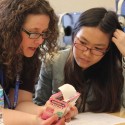
The first steps along the health pathway are ESL 4 Health and ESL 5 Health, which pair healthy living concepts such as nutrition, exercise and CPR/First Aid skills with the fundamentals of language learning. They also introduce the students to foundational concepts such as body systems and chronic illnesses.
Earlier this semester the Level 4 Health class participated in a project-based class project where they researched and developed brochures on nutritional topics. Students polished their research skills, used key vocabulary, and put their computer and design skills to the test. They then used their brochures to talk with classmates of different ESL classes about the important information they had learned on topics like proteins, fibers, and calories. Similarly, the ESL 5 Health students created announcements in English and their native languages, which were read through the PA system about ways to avoid spreading colds and flu. Students then visited other ESL classes to talk with students about the basics of preventing illness such as proper hand-washing.
The next step along the path is the Nurse Aide Training program, which provides the skills necessary to pass the certified nursing exam. In 2014 a new 10-month pilot program open to ESL level 6 through level 8 students was launched to open the door for more students to enter the Nurse Aide Training program at an earlier place in their English language learning. The pilot program features co-teaching by an ESL and a Nurse Aide instructor.
One innovative approach being applied in this class is using song to reinforce technical skills and concepts. Nurse aide training students are tested on 24 discreet skills –from properly washing hands to how to bathe a patient–with each skill having anywhere from 10-25 sequential steps. If a student misses one step of one skill, they fail the test. Led by singer songwriter and Creative Arts Coordinator Tara Villanueva these students are using catchy tunes to remember the skills and steps and at the same time practice language skills. Check out an audio file of one class lesson.
